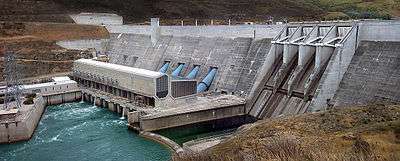Think Big
Think Big was an interventionist state economic strategy of the Third National Government of New Zealand, promoted by the Prime Minister Rob Muldoon (1975-1984) and his National government in the early 1980s. The Think Big schemes saw the government borrow heavily overseas, running up a large external deficit, and using the funds for large-scale industrial projects. Petrochemical and energy related projects figured prominently, designed to utilize New Zealand's abundant natural gas to produce ammonia, urea fertilizer, methanol and petrol.
The National Cabinet Minister Allan Highet coined the "Think Big" label in a speech to a National Party conference in 1977. Economist Brian Easton also used the term "think big" in describing economic strategies.[1]

History
In the late 1970s New Zealand's economy was suffering from the aftermath of the 1973 energy crisis and the loss of its biggest export market[2] upon Britain's entry to the European Economic Community, and from rampant inflation.
In 1978 New Zealand faced a further crisis in oil-supply. OPEC continued to raise the price of oil. Then in 1979 the Iranian Revolution paralysed that country's oil-industry and 5.7 million barrels (910,000 m3) of oil per day were withdrawn from world supply.
In 1978 Bill Birch became the Minister of Energy. He looked to the substantial reserves of natural gas under Taranaki and off its coast as an opportunity to bring life to the ailing economy.
In 1979 the oil crisis worsened. During the first half of 1979 OPEC raised oil prices from US$12 a barrel to US$19 a barrel. The New Zealand government banned weekend sales of petrol. On 30 July 1979, the government introduced carless days, where private motorists had to choose one day of the week, on which they could not drive their motor vehicle. Heavy fines were imposed for motorists who were caught driving on their nominated carless day.
The increases in oil prices substantially worsened the country's already precarious terms of trade. The cost of oil loomed as the major component of the New Zealand balance of payments deficit. Muldoon's administration intended the Think Big projects to reduce New Zealand's reliance on imports, especially oil, and thus improve the balance of payments.
Projects
The core Think Big projects included the construction of the Mobil synthetic-petrol plant at Motunui, the complementary expansion of the oil refinery at Marsden Point near Whangarei, and the building of a stand-alone plant at Waitara to produce methanol for export. Motunui converted natural gas from the off-shore Maui field to methanol, which it then converted to petrol on-site. Declining oil prices rendered this process uneconomic and New Zealand abandoned the manufacture of synthetic petrol.
The construction of the Clyde Dam on the Clutha River formed part of a scheme to generate electricity for smelting aluminium. Construction of a proposed smelter at Aramoana on Otago Harbour never happened — largely because of resistance on environmental grounds.
List of projects
- methanol plant at Waitara
- ammonia/urea plant at Kapuni
- synthetic-petrol plant at Motunui
- expansion of the Marsden Point Oil Refinery
- expansion of the New Zealand Steel plant at Glenbrook
- electrification of the North Island Main Trunk Railway between Te Rapa and Palmerston North
- a third reduction line at the Tiwai Point aluminium smelter, near Bluff
- the Clyde Dam on the Clutha River.
Measuring outcome
Think Big had a positive impact on New Zealand's exports, and saved large quantities of commodity-imports through its process of import substitution. The industrial projects such as Tiwai Point continue to generate profits for their owners. Power generated from the Clyde Dam, the expansion of the Marsden Point Oil Refinery, and the methanol produced at Waitara all provide examples of continuing positive benefits to the economy decades after the completion of the projects.
Approval of Think Big, at least during and soon after the time of its implementation, tended to rely on party affiliations (with National Party supporters backing the projects, while Labour Party supporters opposed them). Think Big projects became synonymous with further inflation and industrial trouble. Richard Prebble said to the Labour Cabinet during the Maori loan affair: "Better to talk about the $7 billion that was borrowed (by Muldoon for Think Big) than about the $600 million that wasn’t."[3]
See also
References
- ↑ Hembry, Owen (31 January 2011). "In the shadow of Think Big". The New Zealand Herald. Retrieved 29 August 2011.
- ↑ "Fuel crisis 'not being taken seriously'". The Dominion Post. 2011-03-27. Retrieved 6 August 2012.
- ↑ Bassett 2006, p. 77,166.
Readings
- Easton, Brian (2001), The Nationbuilders, Auckland University Press, ISBN 1-86940-260-X
- Gustafson, Barry (2002), His Way: A Biography of Robert Muldoon, Auckland University Press, ISBN 1-86940-236-7
- Bassett, Michael and Judith: Roderick Deane: His Life and Times (2006, Viking/Penguin, Auckland) ISBN 0 670 04567 5
External links
- Techhistory: Think Big
- Chronology of World Oil-Market Events 1970-2003 including a detailed annotated graph of oil-prices
